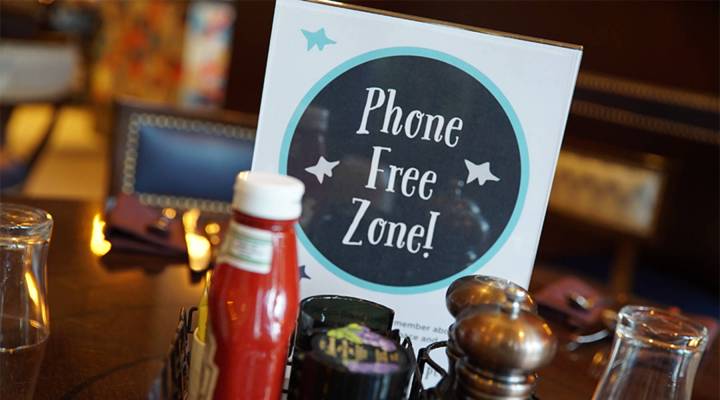
A growing number of travel businesses ask people to ditch their cellphones
A growing number of travel businesses ask people to ditch their cellphones

On a recent afternoon, waiters shuttled menus, daiquiris, and mahi-mahi sandwiches to sun-tanned guests at the Back Bay Bar & Grill, a poolside restaurant inside the Wyndham Grand Bonnet Creek resort in Orlando.
The area is surrounded by palm trees and a lake filled with koi. But for Harry Chomen, it was just a scenic backdrop for more important matters.
“I have stuff going on at work,” he said, scrolling through emails on his phone.
Chomen, a construction manager from Buffalo, New York, had arrived in town just a few hours earlier with his wife and 20-year-old daughter Carly for a weekend vacation. Carly had her head down, too, Snapchatting to a sunshine-deprived audience back home.
“It’s snowing right now, so I was rubbing in my friends’ faces that I was laying by the pool,” she said.
What they didn’t see on their table, between the salt shaker and the ketchup, was a sign that read “Phone Free Zone.” It’s an optional program Wyndham Grand kicked off in October and expects to roll out in all its hotels this year. The premise? Guests put their phones in small gray pouches that remain locked during their meals or leisure activities. Among the enticements to participate in the pilot is a chance to win a five-night stay at the resort.
“It’s an opportunity for families to reconnect,” said Ted Zerfas, director of food and beverage service for Wyndham Grand Orlando.
He approached to the Chomens about participating in the program for the duration of their lunch, and they agreed to do it. Within minutes, they were eating and talking with each other.

Ted Zerfas with Wyndham Grand signs up the Chomens to participate in a Phone Free Zone pilot program. The phone goes in the gray pouch.
A growing number of hotels and other travel-related companies are trying to persuade vacationers to take a break from their smartphones. Some resorts are offering perks like free snorkeling tours to guests who manage to give up their devices for a few hours. A resort in Puerto Vallarta offers a “detox concierge” to replace phones with board games. Yondr, a company that makes locking phone pouches used in many phone-free zones, said its business has expanded globally to include concerts and office spaces.
“We hear from people constantly,” said Yondr CEO Graham Dugoni. “It’s people at resorts. It’s at retreats. We do summer camps. The spectrum is so broad. It’s everything from dentists’ office to the O2 arena.”
Cellphones are competition for an industry whose product is creating experiences for people to enjoy in the here and now, said Art Markman, University of Texas at Austin psychologist.
“You’re supposed to get away from everything. And the thing about your cellphone is it connects you back to all the things that you were doing before you were on vacation,” he said.
In a 2016 study, Markman found that people who used their phones for more than two hours each day during a vacation were more likely to have trouble remembering their trip versus those who were glued to their phones less. It makes some sense for the travel industry to at least try to get people off devices, even it means fewer instant Instagram posts featuring their businesses.
But asking vacationers to drop their phones doesn’t always work out. Rusty Hardley launched his company Off the Grid Tours back in 2013. His idea was to give 10-day cellphone-free sightseeing excursions to breweries in Canada and caves in New Zealand. But he found out quickly that people had to use their phones for so many things.
“Just down to instructions. How to get somewhere. What time to be there,” he said. “It’s almost like they’ve got it to the point where we need these things.”
Our phones are central to who we are and what we do. Even on vacation.
Sandy Higgins from Maryland was vacationing at the Wyndham resort in Orlando, like the Chomens. But unlike them, she said she will never give up her phone.
“I keep my phone with me for emergencies or if the kids have to contact us,” she said.
A 2016 study from Common Sense Media found 69 percent of parents and 78 percent of teens check their devices at least hourly. Divorcing ourselves from our phones on vacation? A bridge too far for many.
There’s a lot happening in the world. Through it all, Marketplace is here for you.
You rely on Marketplace to break down the world’s events and tell you how it affects you in a fact-based, approachable way. We rely on your financial support to keep making that possible.
Your donation today powers the independent journalism that you rely on. For just $5/month, you can help sustain Marketplace so we can keep reporting on the things that matter to you.


















